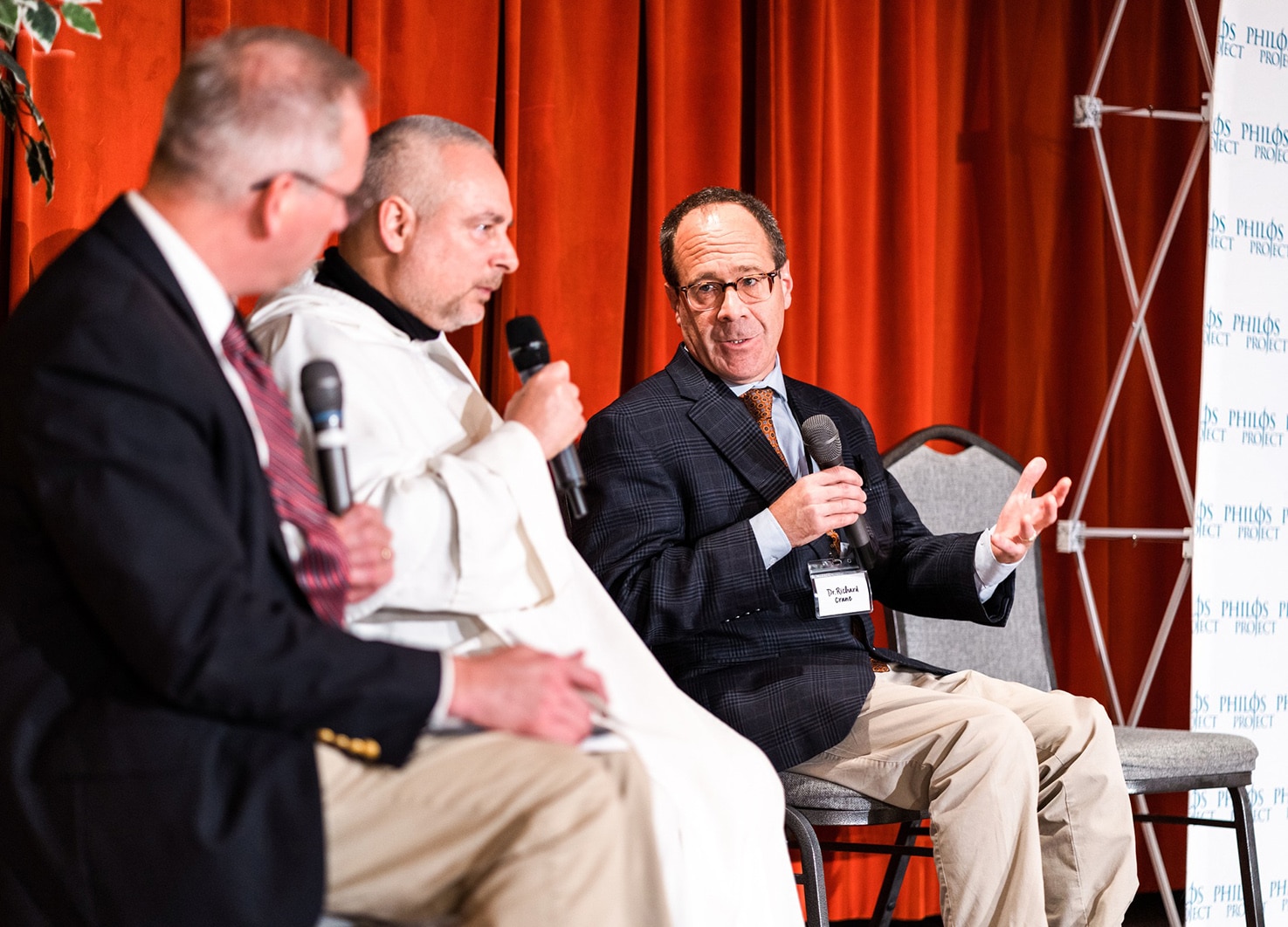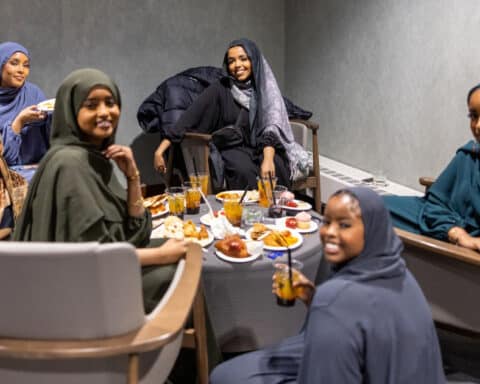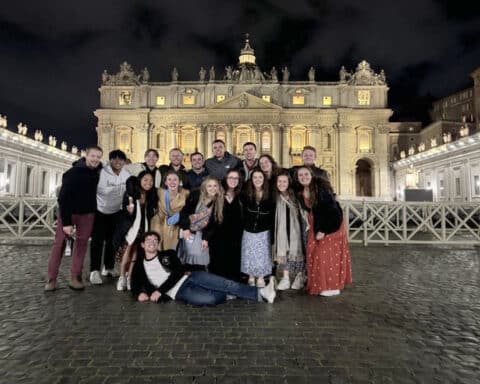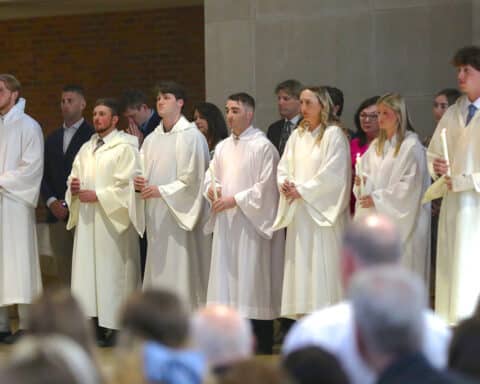Franciscan University of Steubenville had partnered with Philos Project, a Christian advocacy group focusing on the Middle East, to hold a conference Oct. 24-26 on Vatican II document Nostra Aetate, a declaration on the relationship of the Church to the major non-Christian religions of the world. The theme of the gathering was to be “The Future of Catholic-Jewish Relations at a Time of Rising Anti-Semitism.” Then on October 7, Hamas attacked Israel, killing more than 1,200 people.
“We had planned this conference months in advance and when that happened, the thought never occurred to me to not have the conference,” said Stephen Hildebrand, vice president for campus affairs. “Those events gave the conference a heightened sense of importance and timeliness and dominated the conversations.”
After that weekend, the university joined a coalition of more than 100 colleges and universities across the nation that, according to the organizers, “stood in support of Israel and the Palestinians who suffer under Hamas’ cruel rule in Gaza.”
Rabbi Ari Berman, president of Yeshiva University in New York City, is the convener of the coalition. He noted that because “the massacre in Israel put a spotlight on campuses” that university presidents have unparalleled strength in joining together “to lay the moral groundwork in which all civil dialogue is naturally based.”
Campus unrest
However, not all dialogue was civil on campuses in the United States and abroad in the wake of the war. Pro-Palestinian demonstrations erupted, sometimes with violence, at a number of universities. Many Jewish students on those campuses felt threatened, or at least uneasy.
Father Dave Pivonka, TOR, president of Franciscan University, quickly took action to announce an expedited transfer process to Franciscan for Jewish students who felt in danger of anti-Semitic discrimination and violence on their campuses.
“With our fellow Christians around the world, we are praying for peace and justice,” he said. “But with too many universities preaching tolerance but practicing prejudice, we feel compelled to do more. We are witnessing a very troubling spike in antisemitism and serious threats against Jewish students. We want to offer them the chance to transfer immediately.”
So far, there have been a number of inquiries, but no transfers. “To be honest, the offer of friendship and sympathy was really as important as the offer to have students come,” Hildebrand said.
“With too many universities preaching tolerance but practicing prejudice, we feel compelled to do more.”
The conference in October, he noted, was an occasion to educate students about other acts of persecution. That included the persecution of Christians in Nigeria and the brutal suffering of Christians in Iraq.
“Many students are not up on current events,” he said. “The conference made them very aware of what’s going on and made them think about it. It’s a constant struggle for all of us to be aware of what’s going on and then to make others aware.” Prayers for peace in all wartorn countries are offered at the weekend and four daily Masses on campus.
Prayers for peace
Seton Hill University in Greensburg, Pennsylvania, is the home of the National Catholic Center For Holocaust Education. They also have a genocide and Holocaust studies program.
“In the immediate aftermath of the Oct. 7 attacks in Israel and the conflict in Gaza, we held an interfaith prayer service for peace and we have continued to pray at all of our Masses for all those impacted by the ongoing violence,” said Jennifer Reeger, director of communications. “In addition, members of the Muslim Student Association have invited members of the campus community to join them in nightly prayer for peace.”
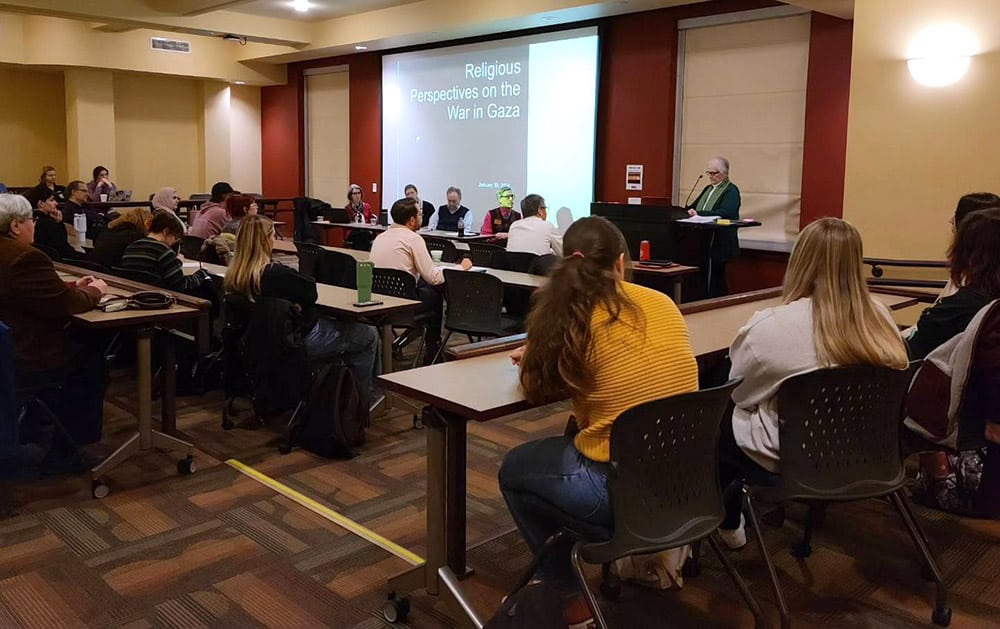
There have been opportunities for the faculty in a variety of academic disciplines to discuss the ongoing conflict in their classes. Seton Hill has also hosted learning opportunities outside the classroom.
The center’s annual Eva Fleischner Lecture in October featured scholars from the Institute for Islamic, Christian, and Jewish Studies in Baltimore. During the program, speakers discussed their work on advancing interreligious dialogue and understanding in the context of what’s happening in Israel and Gaza.
“Through United as Setonians, Together We Thrive — a series of programs in our first year residence halls — students were offered presentations, discussion and reflections on how as an inclusive community we listen to and respect each other,” Reeger said.
The campus ministry also hosted a coffee talk on “Religious Perspectives in the War in Gaza” that included faculty from political science, theology and the Holocaust Center. It focused on the historical and political background and context of the conflict, the presenters’ personal connections to Israel and Gaza, and how the Catholic community can come together in times of crisis around the world.
“During Founders’ Day in March, Seton Hill will also host an interfaith panel on the topic of ‘Religion and Violence,'” Reeger said. “It will explore how religion has contributed to violence and when religion has been a force of opposition to violence.”

